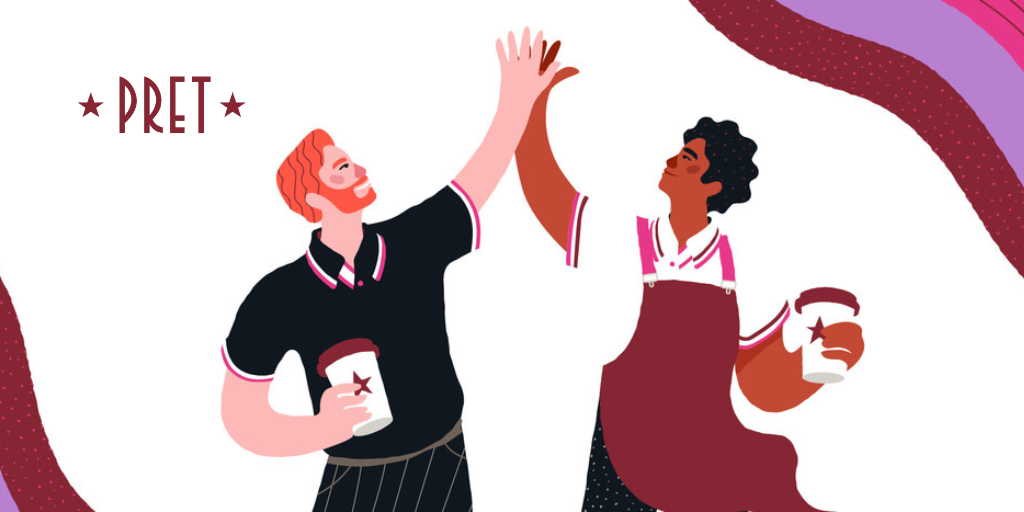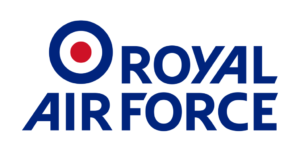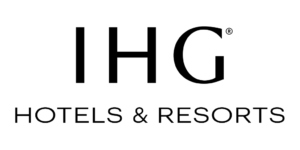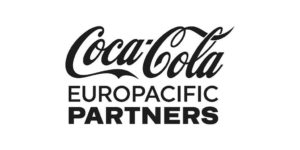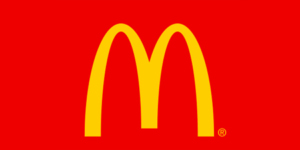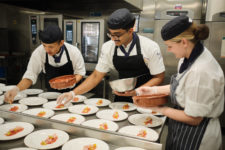Barista careers guide and job profile

Have a passion for great coffee and even better service? Becoming a barista is a great way to launch your career in the food and beverage industry.
Getting into Barista Careers
A Barista makes and serves coffees and other hot and cold drinks in businesses such as coffee shops, restaurants, cafés, or hotels.
How much money can you earn as a Barista?
These LMI Job Trends give you a sneak peek of how much you could earn starting out for this career, and how much your salary could grow with experience.
Salary guide for Barista jobs
Your earning potential as a Barista depends on your location, experience, and the type of establishment, so you could be earning anything between £12,500 to £20,000 or more. Many employers offer perks such as career development opportunities including training programs/apprenticeships.
Catering & Hospitality Career FAQs

What would you like to know about catering & hospitality careers? Maybe we can help!
Skills you need to become a Barista
Useful skills to put in your CV:
- Customer service skills. It’ll be your job to ensure that every customer who comes through the doors has a great experience and wants to return.
- Sales skills. You might need to recommend items to customers and upsell other products with their orders.
- Great teamwork. Food and drinks businesses are busy, fast-paced work environments and you’ll need to have a supportive and collaborative relationship with the rest of your team.
- A passion for and active interest in food and drink, particularly great coffee.
- A detail-oriented approach. It is the little things that take a cup of coffee, or a customer service experience, from good to exceptional.
- Cleanliness, tidiness, and organisational skills. You’ll need to maintain a clean and hygienic environment for preparing and serving food and drinks, making sure that everything is organised and in its proper place.
- Getting a Food Hygiene Certificate can also look great on your CV when you apply for food and drinks jobs.
Top Skills-boosting Tips
Learn as much as you can about coffee in your spare time. You can read books and magazines, watch YouTube videos, follow experts on social media, and even practice making great drinks at home.
How Do You Get These Skills?
Vocational qualifications and work experience will help you build these skills over time.

Build Your Skills With the FREE Young Professional Programme
What Qualifications & Training Do You Need For Barista Careers?
School, College And Training
You can get a job as a Barista directly from school without any additional training, but there are various courses you can take to boost your skills before applying for a job, if you prefer. You might also consider taking a relevant course and working part-time as a Barista while you study. While you can become a Barista from the age of 16, some companies prefer to hire those who are 18 or over.
T-Levels
T-Levels are a choice for learners after GCSEs alongside apprenticeships and A-levels. T-Levels in Hospitality and Catering will be introduced in England in 2022, and can be a great choice if you want to work in the food and beverage industry.
BTECs
As an alternative to A-Levels, you can do BTECs from the age of 16.
There are several BTEC options that can be a good springboard into a food and drinks career. You might wish to consider:
- Level 1 Certificate in General Food and Beverage in Hospitality
- Level 1 Award in Introduction to Employment in the Hospitality Industry
- Level 2 Award in Hospitality and Catering
- Level 2 Diploma in Food and Beverage Service
- Level 3 Diploma in Hospitality
- Level 3 Specialist Certificate in Hospitality and Catering Principles (Professional Cookery)
You’ll normally need 2 or more GCSEs at grades 9-3 (A*-D) or equivalent for a Level 2 course. If your qualifications are lower than this, you’ll most likely start on a Level 1 course.
Short Courses
Many colleges offer short courses in Barista Skills, lasting anywhere from from two hours up to about a week (or occasionally longer). These hands-on courses will teach you practical skills that will help you go straight into a Barista job. They also look great on your CV. The BTEC Level 2 Award in Barista Skills, which takes 20 learning hours to complete, is one great option.
As an alternative to going to college, you can also take Barista courses offered directly by various industry experts, businesses, or organisations. For example, artisan coffee chain 200 Degrees offers “Barista Schools” around the country, and the London School of Coffee offers both in-person and online options.
Apprenticeships
An apprenticeship is a scheme where you train while earning a starting salary. With an apprenticeship (or advanced apprenticeship) you’ll have a paid job with an employer that includes structured training and learning. This training leads to an official qualification that’s recognised by employers as an industry standard.
Several well-known coffee companies offer apprenticeships at various levels. For example, Starbucks offers a 12-month Level 2 Apprenticeship as a Hospitality Team Member with Barista pathway as well as Level 3 and Higher (foundation degree or degree-level) apprenticeships. Caffe Nero offers an accelerated 18-month Level 3 apprenticeship which will train you in various job roles from Barista to Future Manager.
University degrees and graduates
You do not need to go to university to work in the food and beverage industry. However, if you want to study to a higher level, a degree can be a great way to launch your career.
Degree subjects such as Hospitality and Catering, Hospitality Management, Food and Beverage Production, or Food and Drinks Management are ideal for a career in this industry.
UCAS has more information on degree courses and entry requirements.
Career Progression
As you gain experience as a Barista, you might become a Team Leader or Shift Leader, overseeing a team of Baristas. You could also become a Store Manager and eventually move up to a Regional Manager role.
If you like the idea of working for yourself and running your own business, you could even open your own café or coffee shop.
Pret Apprenticeships and Careers
When you apply for a Pret Apprenticeship or junior role, you'll belong to a community of achievers. Get support on your own unique career journey!
What Work Experience Do You Need For Barista Jobs?
Work Experience Tips
If you think working as a Barista is the right job for you, any experience in the food and drinks or food service industry will help. If you have ever had a summer job in a café, worked behind a bar, or waited tables at a restaurant, this is all great experience. Other customer service roles, such as working in a shop or on a reception desk, will also serve you well when looking for Barista jobs.
You’ll need to demonstrate great customer service skills, attention to detail, and a passion for making and serving great food and drinks.
Examples of relevant work experience include:
- Work shadowing (even if it’s just for a day)
- Work placements in a company
- Work experience placements on a college or university course
Volunteering Tips
You can build your skills in your own time to enhance your application and help yourself to stand out to employers. Though you are unlikely to have access to a Barista-standard coffee machine, you can still practice at home with the equipment you do have access to. Written materials, videos, and other materials can also help you to learn. Skillshare, MOOC-List, and StartMyCoffeeShop have some great resources you can check out, and YouTube channels such as Paddy and Scott’s and Whole Latte Love offer instructional and educational videos on all aspects of coffee and barista skills.
If you’re involved in any clubs or extracurricular activities, why not volunteer to run the coffee stall at an event? This will help you practice making drinks to order and offering great service in a busy environment.
What Does A Barista Do?
What do Barista careers involve?
A Barista works within a food and drinks service environment such as a café, coffee shop, restaurant, or hotel. They prepare and serve drinks, particularly coffee but also including tea, hot chocolate, and cold drinks. They may also prepare and serve food.
Example daily job responsibilities
- Opening the business in the morning and getting it ready for the day’s customers
- Greeting customers as they arrive
- Taking orders, including custom and non-standard orders
- Preparing coffees and other hot and cold beverages
- Suggesting or recommending menu items
- Upselling other products to customers
- Serving food such as cakes, pastries, and sandwiches
- Cleaning mugs, plates, utensils, etc.
- Maintaining and cleaning equipment such as coffee machines, including reporting any faults
- Cash handling and payment processing
- Dealing with customer feedback and complaints
- Keeping the work area clean and tidy
- Cleaning tables and seating areas after use
- Closing up the business at the end of the working day
How To Find Barista Jobs: Next Steps
To find jobs for young people in this role, search on jobs boards for early career roles and opportunities with these words in the title:
- Barista
- Café Worker
- Café Assistant
- Coffee Shop Assistant
Get Into Hospitality Careers With Youth-Friendly Employers
These employers and organisations are here to help. They care about your potential and desire to learn, not just your qualifications and experience. They may be able to offer traineeships, apprenticeships, graduate schemes, first jobs, careers advice, wellbeing support and much more.
Catering & Hospitality Career Tips & Opportunities
Catering & Hospitality Career Guides
View job descriptions with average UK salary, useful qualifications and a variety of routes into this career.
See All Our Youth-Friendly Employers

























YES! I Want More Free Careers Help...
So what are you waiting for? Grab your future.

